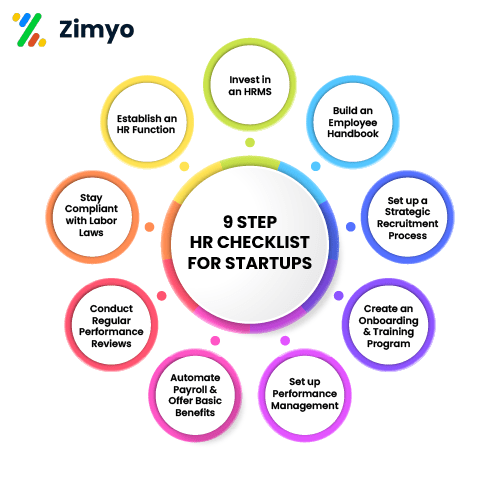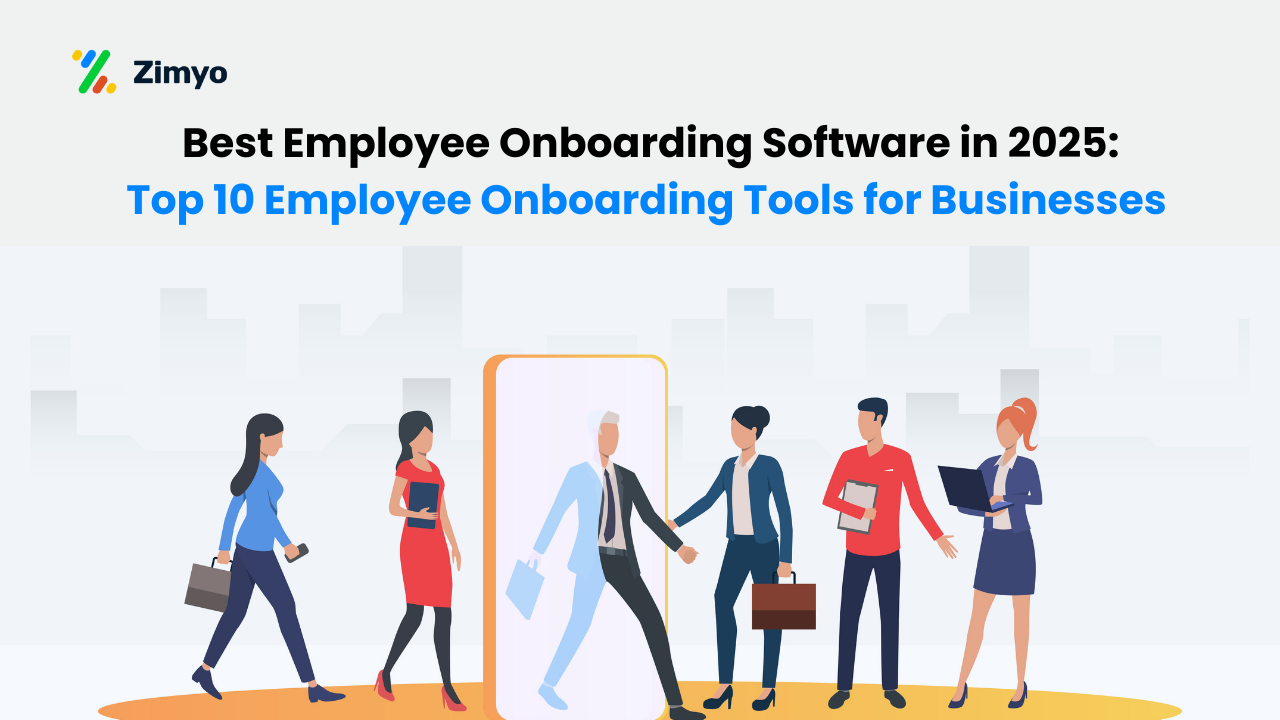Launching a startup is thrilling but the rush of building something from scratch, chasing bold startup ideas, and watching your vision come to life. But amid product sprints, funding rounds, and customer acquisition, one thing often gets sidelined: Human Resources.
Many entrepreneurs think of HR as something to deal with later, once the team grows. In reality, human resources for startups is not a luxury, it’s a necessity. Neglecting HR early on can lead to legal challenges, poor hiring decisions, high turnover, and a toxic work culture which I’m sure no entrepreneur wants.
This blog is your go-to guide, a detailed HR checklist to help you avoid those common pitfalls and build a strong foundation for growth.
Importance of HR in Startups
Imagine you’ve hired a few people on the fly. There are no defined roles, no offer letters, no onboarding process. Everyone’s learning on the job, and you’re figuring it out as you go. It works until it doesn’t.
Here are some real pain points most startups face without proper HR systems:
Chaotic Hiring- Without structured hiring practices, startups often hire based on urgency, not fit. This leads to mismatched expectations, poor performance, and eventually, attrition.
Legal Risks- Missing offer letters, improper contracts, and lack of labor law compliance can put your business at legal risk especially in countries like India, where regulations are strict.
Culture Clashes- When roles and responsibilities aren’t defined, confusion reigns. This impacts morale and disrupts team dynamics.
Lack of Scalability- What works for 5 people breaks down at 15. Without scalable systems, growth becomes messy and inefficient.
To overcome these challenges and ensuring easy organizational flow Human Resource Management is important.
Check Out our blog for understanding Human Resource Management and it’s importance.
How HR for Startups Adds Real Value from Day One
If you’re still wondering whether your startup really needs HR, the answer is a definite yes. Regardless of your size or stage, having a human resources framework in place is essential. A good HR function helps build strong internal policies, manage team needs, and protect your startup from long-term risks.
Here’s how HR adds real value from day one:
Promotes a Culture of Integrity:
Understand that HR plays a key role in embedding ethical values into your workplace. Many issues stem from unclear expectations or poor company culture, something HR actively nurtures and monitors.
Ensures Legal Compliance:
Hiring across regions, especially in remote or hybrid models, brings legal complexities. And HR ensures that your business adheres to local employment laws, including those around termination policies and employee rights.
Adapts Company Policies:
Startups evolve fast, and so should their internal policies. Here HR helps create adaptable frameworks and policies that give your company the flexibility to update rules and benefits as needed.
Manages Pay and Benefits Effectively:
HR works closely with finance to ensure that salaries, benefits, and reimbursements are handled efficiently making sure employees always have clarity about their compensation.
Builds Awareness of Company Culture:
To understand how your culture is perceived on the ground, HR must stay connected with employees across all levels. Regular check-ins and open conversations help surface issues early and foster trust.
Aligns Growth with People Strategy:
As your startup scales, HR can define goals that align with business priorities. From the first few months onward, HR should establish actionable goals to support team expansion, performance, and engagement.

Your 9-Step HR Checklist for Startups
Setting up human resources for startups may feel overwhelming especially when you’re juggling product development, sales, and funding. But by breaking it into these manageable steps, you’ll lay the foundation for scalable and legally compliant growth.
Here’s how to manage HR from day one whether you’re a team of 2 or 20. Let’s break down each step with actionable insights:
Step 1: Establish an HR Function, Even If You're Small
Usually, startups often operate in survival mode, prioritizing growth over structure. But ignoring HR until later invites risk. The first step is assigning HR responsibilities even if you don’t have a dedicated HR hire.
Implementation Tip:
- Designate an HR point person (could be a co-founder or operations lead).
- Create a simple system for storing employee documents and contracts.
- Begin tracking key HR data like employee start dates, salaries, and performance milestones.
By starting early, you avoid chaos later and create a culture of organization from the beginning.
Step 2: Invest in an HRMS to Automate Core Tasks
An HRMS (Human Resource Management System) is a lifesaver for lean teams. It helps you automate critical HR functions, save time, and stay compliant without needing a large HR team. Using an HRMS can organize your workflows from Day 1.
What It Solves:
- Eliminates spreadsheet fatigue
- Reduces manual errors in payroll, attendance, and leave
- Centralizes human resources information
Zimyo HRMS is The HRMS software to handle all your HR processes, doesn’t matter if you have an employee count of 10 or 1000’s it got you covered.
Step 3: Build a Transparent Employee Handbook
Startups thrive on flexibility, but ambiguity is dangerous when it comes to people management. An employee handbook offers clarity and consistency in your work culture and expectations.
Key Inclusions:
- Working hours and leave policy
- Code of conduct and ethics
- Anti-harassment (POSH) policies
- Remote/hybrid work guidelines
This also shows new hires that your startup takes its people seriously — creating a sense of stability even in an evolving environment.
Step 4: Set Up a Strategic Recruitment Process
Hiring the wrong person is costly, especially in a startup where every hire plays a critical role. A well-defined recruitment process improves hiring quality and saves precious time.
How to Structure It:
- Create detailed job descriptions aligned with business needs
- Use hiring tools (e.g., Google Forms, LinkedIn, ATS systems)
- Standardize interview questions and evaluation criteria
- Document and archive every candidate’s progress for future reference
Hiring shouldn’t feel like a scramble. Treat it like a process by Zimyo HRMS.
Step 5: Create an Onboarding and Training Program
Too often, startups onboard new hires with a laptop and a Teams login and leave them to sink or swim. This leads to confusion, low engagement, and early exits.
What a Good Onboarding Looks Like:
- A structured Day 1 plan (introductions, policies, tools)
- 7-day and 30-day check-ins
- Access to a training hub or knowledge base
- Assigned mentors or “buddies” for new employees
Onboarding is your chance to imprint your culture and help new hires hit the ground running.
Step 6: Set Up Performance Management from the Start
In early-stage teams, performance feedback is often informal. But as your startup grows, having a consistent performance review process is key to retention and development.
What to Implement:
- Define roles and KPIs early
- Set monthly or quarterly check-ins
- Use employee performance management software
- Encourage two-way feedback: employees should also review managers
This isn’t just about evaluating work — it’s about showing people they’re seen, heard, and supported.
Step 7: Automate Payroll and Offer Basic Benefits
Payroll isn’t just about transferring salaries. It’s one of the most sensitive parts of human resources for startups, with legal and emotional stakes.
What to Include:
- Salary processing with tax, PF, ESI deductions
- Pay slip generation and distribution
- Reimbursement workflows
- Optional: medical insurance, mental health benefits, wellness stipends
With Zimyo HRMS’s five click payroll authorization you ease your payroll process. It also makes sure you stay accurate, compliant, and trusted by your employees.
Step 8: Conduct Regular and Fair Performance Reviews
Too many startups postpone reviews until someone asks for a raise or threatens to leave. But performance reviews are about more than compensation, they’re about aligning individual growth with company goals.
Make It Effective:
- Hold biannual or quarterly reviews
- Mix self-assessment, manager feedback, and peer input
- Focus on achievements, challenges, and development goals
- Document reviews for future promotions and decisions
The goal is to build a culture of feedback, not fear.
Step 9: Stay Compliant with Labor Laws
You may be small, but you’re still subject to national and local labor laws. Startups often overlook this until it’s too late — and then face penalties or lawsuits.
Must-Follow Compliance Areas (India Example):
- Shops & Establishment Act registration
- Provident Fund (PF) and Employee State Insurance (ESI)
- POSH (Prevention of Sexual Harassment) policy and awareness
- Gratuity and minimum wage adherence
Pro Tip: You can outsource this to human resources services or legal consultants or use your HRMS like Zimyo which offers compliance checklists.
Bonus Step: Conduct Annual HR Audits
Every growing business needs a health check and your HR operations are no different. An HR audit helps you fix small cracks before they become serious gaps.
What to Audit:
- Are offer letters and contracts in place?
- Is your handbook up to date?
- Are you tracking time off and performance properly?
- Is payroll aligned with local compliance laws?
This step ensures your people systems scale with your growth and don’t break when you hit 20, 50, or 100 employees. Better to use an HR Audit Checklist.
Tips for First-Time Entrepreneurs
Tips for First-Time Entrepreneurs
- Don’t wait to set up HR – doing it later only creates more work.
- Use tech – an HRMS can reduce up to 60% of manual tasks.
- Document everything – even if your team is small, paper trails protect you.
- Focus on culture early – it becomes your brand’s identity as you grow.
- Follow labor laws – Make sure you’re legally compliant with contracts, wages, and employee rights.
- Be ready to grow – Build HR systems that can handle team growth and changes easily.
Conclusion: Build People Processes That Scale with You
HR for startups isn’t about bureaucracy. It’s about building the people systems that allows your business to thrive.
When you hire right, onboard smoothly, pay fairly, and comply with the law — you create an environment where talent wants to stay. And that’s how you win in the long run.
So, whether you’re chasing the next big startup idea or bootstrapping a SaaS product — don’t overlook the human side of your business.
Start building your HR foundation today.
Simplify Your HR Processes with Zimyo
Zimyo offers an all-in-one HRMS platform that simplifies everything from payroll and leave management to employee engagement and compliance. With over 50 customizable modules, you can choose exactly what your startup or growing business needs.
The cloud-based system ensures secure access anytime, while features like AI-driven analytics, automated payroll, and real-time reporting help you make smarter HR decisions. Whether you’re a small team or managing thousands of employees, Zimyo scales your business.
Trusted by large enterprises and startups alike, Zimyo’s flexible, user-friendly HR software is designed to save time, reduce errors, and improve your people operations. With features like:
- Five click payroll authorization
- Smooth onboarding & offboarding process
- Centralized document storage
- Role-based access and permissions
- Secure, cloud-based data storage
- Built-in statutory compliance tools
- Dedicated employee helpdesk support
- Bilingual mobile access for employees on the go
FAQs:
What is the role of HR in startups?
HR helps manage hiring, employee relations, payroll, compliance, and culture — all crucial for growth.
Can startups outsource human resources services?
Yes! Many startups outsource HR tasks like payroll, legal compliance, and recruitment to third-party agencies or consultants.
What’s the best HRMS for startups?
Platforms like Zimyo, greytHR, and Zoho People offer budget-friendly HRMS solutions tailored to startups.
When should a startup hire its first HR person?
Ideally, by the time you hit 10–15 employees. Until then, a co-founder or admin can manage HR with the help of software or services.








